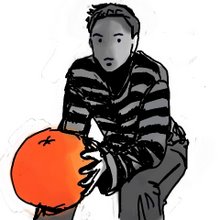Today’s post is a bit of an irregularity for this blog, and I’ve thought not a little about whether or not I should even post it (I'm insufferable. I’ve read a total of two pages today that were not about football and already I have been swayed by language like ‘not a little’). But I have decided to go through with it.
This post is unlike my previous and future posts because it actually acknowledges you, the reader. I can now no longer pretend that my blog does not prove, to some extent, that I take myself entirely more serious than I should. By asking you this question I can now no longer pretend I think this blog is for anyone other than those directly around me, because I could have asked them the question personally. But if only one of you tries to answer my question, exposing to you the true extent of my megalomania will have been worth it.
What happened to Franz?
Some of you may know Franz better as Franz Beckenbauer (I can call him Franz because today I met someone who had met Franz earlier that day. Which means I know someone who knows, or has at the very least talked to der Kaiser. Der. Kaiser. People.). Informing about his whereabouts may at first seem somewhat peculiar, because Franz is all over the news. Franz is no longer just Franz, which was quite the feat in and of itself. Franz is football. Franz is politics. People like to be seen with Franz. Franz can call the German prime minister and ask her out for a cup of coffee and she’ll immediately leave nine out of ten official meetings with heads of state to oblige. So the question where Franz is right now, is not a difficult one to answer. Franz is everywhere.
Problem solved, one could say. But I’m afraid the question I ask you is not about that Franz. The question is about the elegant defender of the seventies, although calling him defender would be not nearly enough credit to him when it is certainly due. About the sweeper, who could sweep up anything that went past the defence in front of him and neatly convert it to the start of an attack in one smooth move. That kind of defender.
What happened to him? Why do we only seem him so very rarely anymore these days? The role has been played by people who’s capability to do so has been, and should have been, seriously contested by some. So the reason we don’t see many players striding gracefully to the front cannot be simply explained by a supposed quality detriment.
My answer to it is that those who have the qualities to play this role at one point collectively decided that it was even easier to just loiter up front and direct the play only in the most glamorous part of the field. From behind the striker, so they can both score goals themselves and take credit for setting up the poor bastard in front of him from time to time.
So coaches of this world, hear (or, read) this plea: next time you have yet another meaningless preseason friendly game, be it against a local amateur team or against a collection of stars from around the world, consider this. You have someone in your team who has that magnificent view down the field, yet all he sees is the last thirty meters of the field and the first fifteen rows of the stands behind the goal. Why does he need to see those stands? Wouldn’t you much rather have him play from somewhere where all that vision is put to much better use? This man is your best attacker, yet he only participates in the attack for the final twenty-five percent of the field. Read that line again. It’s madness. He has to be there from the very start!
And to all of you glamorous shadow strikers out there (I mean, even your position sounds by far the coolest out of all positions. Shadow Striker? That could very well be the title of some Japanese ninja film): Remember Franz escorted Heidi Klum onto the stage of the World Cup 2006 Draw. Which he managed to lure to
So if any of you who read this feel you’re someone who might actually have an answer to this question, please feel free - by which I mean I will be forever disappointed with you if you don’t. Hey, if all else fails, guilt is always the way to go – to share them.
